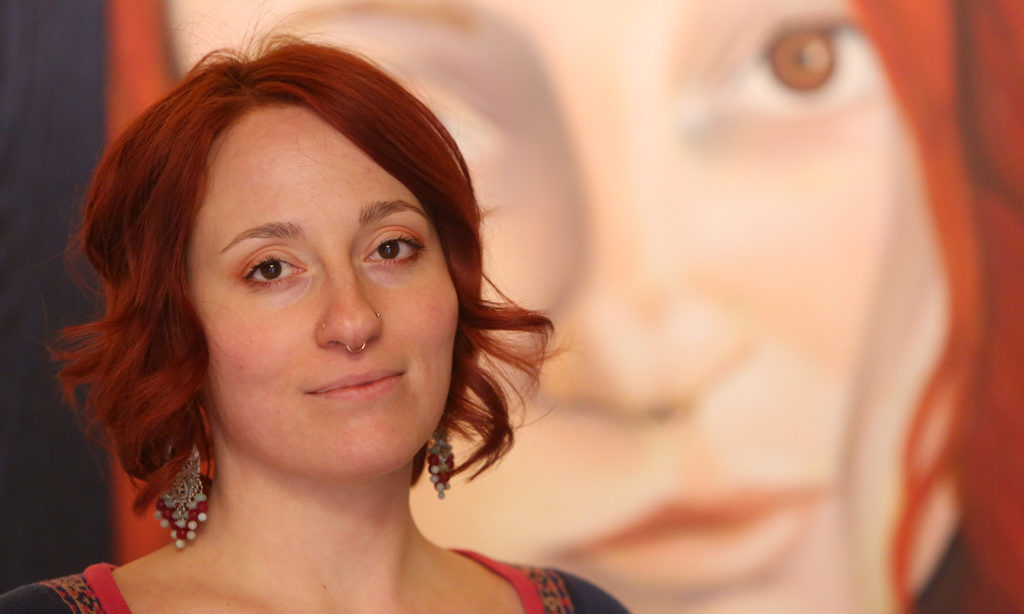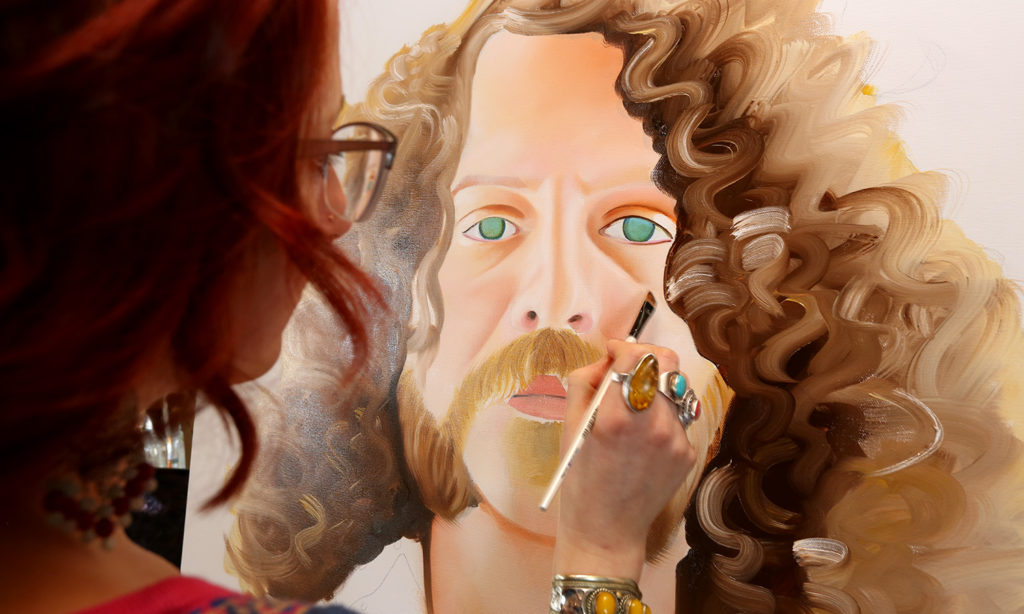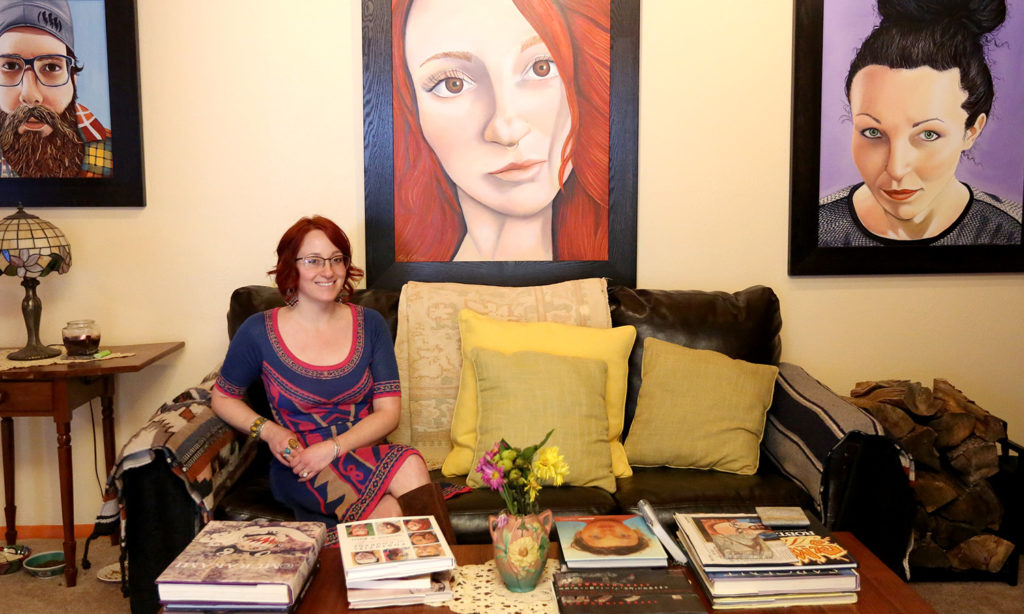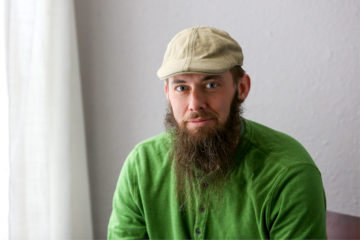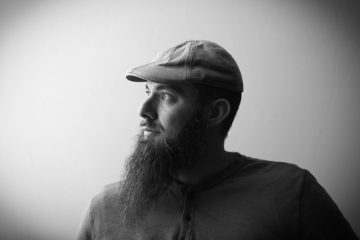Large portraits, bright and colorful paintings, hang on the walls of Molly McClure’s house. In her kitchen, hallway, living room and elsewhere. They are hers, her work. Some of them even are her face.
Molly, 31, sat down with Humanitou and a cup of tea. She offered thoughtful and unflinching answers to questions about her art and her family.
She shared her struggles and joys, sobriety and gratitude, inspirations and the beauty of life.
Humanitou: Do you have a morning ritual?
Molly: I get up around 6. Then I draw, make breakfast and I write.
Humanitou: I know of your painting, so we’ll get to that. I’m curious to hear more about the writing side of your life.
Molly: Writing, actually, is a huge part of my life. I free write every day. I write a minimum of three pages. I’ve been doing that for, probably, three years.
In high school, I started my creative process as a poet. I was a stand-up poet for quite a while. It was more performance than anything. It wasn’t slam poetry at all.
I started with a team of women. They came to our school. I went to Community Prep High School downtown (Colorado Springs, Colo.). It’s an alternative type of school. The ladies came in to, kind of, boost our self-esteem. I really liked them. They were in their 20s to 60s.
The school let me join them and go teach other classes at other schools. It was really fun. I traveled the state doing performance. After high school, I stopped doing that. I really focused on art.
Humanitou: The three pages you write every morning, any chance that comes from The Artist’s Way?
Molly: It is. I had a co-worker many years ago who was like, “You should read this book.” That was my big takeaway, writing everyday.
Humanitou: Did The Artist’s Way have any particular influence on you beyond the morning pages? I see the way Julia Cameron talks through that book as being more than art. There’s a spirituality, a human quality to it. I think it’s good for anyone, not just artists.
Molly: I agree. I read that book about three years ago. I, actually, didn’t even finish the whole book, which was unusual because I love to read. I really enjoyed the writing point, so I stuck with it.
Humanitou: You had written poetry before. Was the free writing style encouraged in The Artist’s Way something different for you?
Molly: Yeah, it was new. Now, it’s part of my life practice. It’s a good place to reflect or make decisions, or figure stuff out.
Humanitou: You paint portraiture, people’s faces. You exhibit your work often and you paint commissions. And you paint murals, huge-scale portraits. What is it about portraiture?
Molly: I’ve always been into portraiture. I started drawing when I was really young, and I’ve always drawn people. I like eyes. I love people’s beautiful mouths. I love everything about the way people look. They’re fun.
After I started working with (an) architectural company, I stopped doing art for about four years. I was kind of soured with it for a little bit.
I actually started painting when I got sober. I feel like it’s been the most alive I’ve ever felt in my life, being sober and creating, and figuring out who I am and how I fit into the world.
But I had this really pretty Lithuanian friend, her name is Ineta, and in college I painted her a lot. When I got back to Colorado (from Provo, Utah), I found this picture of her online and I was like, “Oh my gosh, I want to paint her again.”
In that process, I don’t know, something clicked. I painted another portrait of her and I painted another portrait of her, and I painted another portrait of her.
Then I started to paint myself, because I can make more faces and I was in front of me. She moved to Vietnam to teach English, so I couldn’t see her anymore.
I started to take pictures of myself and it went from there.
Humanitou: What inspires you?
Molly: Experience. Life is fun. Life is really fun.
Life has a lot of beauty to it, and a lot of pain. I think that all of us are trying to find our own way. I think I gain inspiration from being around beautiful experiences and beautiful people, trying to identify who I am in relation to those things.
I love dancing. Dancing is one of my favorite things. Music inspires me. I love music. I am not a musician. I’m not talented in that way, but the fact somebody else can create that beauty and share it with me inspires me enormously. It brings so much joy to my life.
I love to go to Burning Man. I’ve been going for the past decade. I go out there because the art is insane. People build the craziest stuff, the most amazing, inspiring things. And then they burn it or they disassemble it. Sometimes people move that art. But it’s really beautiful.
I’m inspired by what other people can do with themselves, because life is hard. This is going to sound a little dramatic, but the struggle of just existing in life is kind of hard, I think.
To watch people succeed and be able to express themselves is a truly beautiful thing.
Humanitou: I’m curious about that struggle for you. It sounds like you’re referring to something in yourself. Do you mind sharing?
Molly: I don’t mind. … I’m an alcoholic and I have been sober for three years. Addiction has played a huge role in my life. It has since I was real young, since probably 13.
I got married really young to a super-fun person. We had a really great time and we’re still pals, which is nice, but it ended really young and it caused a lot of pain in my life.
I actually started painting when I got sober, and I feel like it’s been the most alive I’ve ever felt in my life, being sober and creating, and figuring out who I am and how I fit into the world.
It’s been the best experience of my life, and I never thought it could be so big and beautiful.
Humanitou: The positivity there, the connection to inspiration and beauty is wonderful.
I’m curious, knowing we have The Artist’s Way as a connection point and both having noticed the current of spirituality Julia Cameron ties to creativity in that book, do you have a practice or a view of … that?
Molly: Yes. Hugely. I think it’s a guiding force in everything that we do.
When I paint, it’s like meditation, legitimately. My brain becomes quiet, my mind is still and I can enjoy moments of stillness.
It’s interesting to talk about spirituality, because I feel that, especially in our generation, people are not comfortable talking about it. It almost has some taboo qualities to it these days, I think. I would definitely consider myself a spiritual person.
It’s my connection to that, whatever that is, that keeps me creating and seeing life in a positive way.
Humanitou: Is there something you visualize with the word spirituality? Something that defines and clarifies the idea for you?
Molly: I’m constantly trying to improve my contact with a greater spirit, I suppose.
There are actions that I try to take. I try to stay in gratitude a lot. Sometimes that’s through prayer and sometimes that’s through writing.
Part of my morning pages is reflecting on the things that I’m grateful for. I do that daily so it helps me stay in that, and I think that staying in gratitude helps you stay, at least in my life, spiritual and connected.
We danced in front of the mirrors for hours, and we cried and we watched ourselves cry, and we watched ourselves dance. I’ve held onto that memory forever.
I had never opened myself up spiritually before. That’s been a big part of my own self-discovery these past three years. I never really had spiritual guidance. I was raised atheist. I’ve always had an interest in spiritual things.
I’ve liked to study religion. In college, I did a lot of that, but I never really spiritually connected with any idea out there. So I’ve been just trying to connect personally on an intimate level.
Humanitou: Is there a childhood memory you hold and tend to come back to?
Molly: There’s a few. … This is a memory that’s had a lot of influence on my life.
My grandma was sick. I was probably 10 or 11 years old. My mom was with her mom in Indiana. My dad, brother and I were together in Monument (Colo.), where I grew up.
My dad woke us up one night and got us out of bed. We always had a lot of candles lit in my house. There’s a song by Amy Mann, “It’s Not Going to Stop Until You Wise Up,” and my dad put that song on repeat.
We had these big mirrors and we danced in front of the mirrors for hours, and we cried and we watched ourselves cry, and we watched ourselves dance.
I’ve held onto that memory forever, because I think it’s really special and really beautiful. It’s defined a lot of things for me. There was a rawness to it then and every time I tell anybody about it there’s still a rawness to it.
We still dance in front of the mirror as a family, and it’s still a lot of fun.
Humanitou: What reasons bring you together to dance in front of the mirror now?
Molly: For celebrations, usually.
Humanitou: I love that. Part of that is, as a man, the dancing thing. At early ages, boys are conditioned to tighten up our natural feelings with our bodies, beyond the utilitarian and competitive. We are taught by social norms not to express freely through our bodies.
To hear your dad dances as a means of expressing joy, sadness, whatever he’s feeling is wonderful. I love that. And it sounds like there is a closeness in your family.
Molly: Every family is super, super complicated. My family is no different in that regard.
My dad is one of the most influential people in my life … for better or worse. My dad is a fabulous dancer. We took tango lessons when I was 10 or 11.
My mom and my dad used to go out, before my brother and I existed, and dance all the time. Phenomenal dancers. They both love to dance. I got that from both of my folks. It’s like musical … obsession, I suppose, runs in the family.
My mom, when she would have a bad day, she’d come home and turn on some great music. She liked “Witchy Woman” a lot; it’s really bassy. We had these huge speakers. She’d sit there with the bass on her back and be absorbed by that.
We’re all really feely, emotional people. Very emotional people. Sometimes it’s wonderful, sometimes it’s extremely volatile. (laughs) It can cause a lot of chaos. We’re all loud and intense people.
Humanitou: It’s interesting you say loud and intense, because in this conversation you are so soft and thoughtful in your responses. You know, not loud and chaotic.
Molly: (laughs) It’s funny how you can have so many things be a part of you and who you are.
I can be very kind and quiet and considerate and thoughtful, or I can be loud and vulgar and grotesque. It just depends on my mood. And it’s the same way with almost every member of my family.
My father is a very thought-provoking, interesting, intuitive human being who can be very kind and very gentle, and also be terrifying and enormous and suffocating.
It’s interesting how we all have these dichotomies.
Humanitou: It’s true. My boys might have similar things to say about me when we’re further down the line. We all have the balances of … contradictions we work with.
Molly: I feel like I’m a walking contradiction most of the time.
Humanitou: How are you influenced in your art, given these personal dichotomies and the influence of your family?
Molly: It’s funny how much my work ties in with my family. My work and my family, it’s almost inseparable.
My father’s mother paints portraits. She passed away a few years ago of a stroke in Tennessee. She’s a phenomenal artist. She’s an award-winning artist. She’s such an interesting human being. Her work is a amazing, and I’m lucky enough to have a few pieces of her work.
So, she’s an artist. Because of that her sons take art very seriously. And because of that I take art very seriously. My dad’s a painter, as well, besides an engineer and an architect.
There’s always been a great seriousness around art. It’s not a free thing; it’s so much bigger than that. At least, I’ve been taught that. And I believe that. I’ve been taught that craftsmanship is one of the most important things to be an artist, and to be a person.
I don’t even know how to answer how much it’s influenced my life, but it has in every way imaginable. Painting and my family, they’re inseparable.
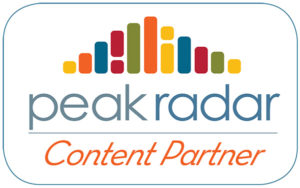 This Humanitou conversation is cross-posted at PeakRadar.com. PeakRadar.com is the Pikes Peak region’s cultural calendar and digital cultural center, connecting residents and tourists with our vibrant arts community. Your source for what’s happening is PeakRadar.com!
This Humanitou conversation is cross-posted at PeakRadar.com. PeakRadar.com is the Pikes Peak region’s cultural calendar and digital cultural center, connecting residents and tourists with our vibrant arts community. Your source for what’s happening is PeakRadar.com!
